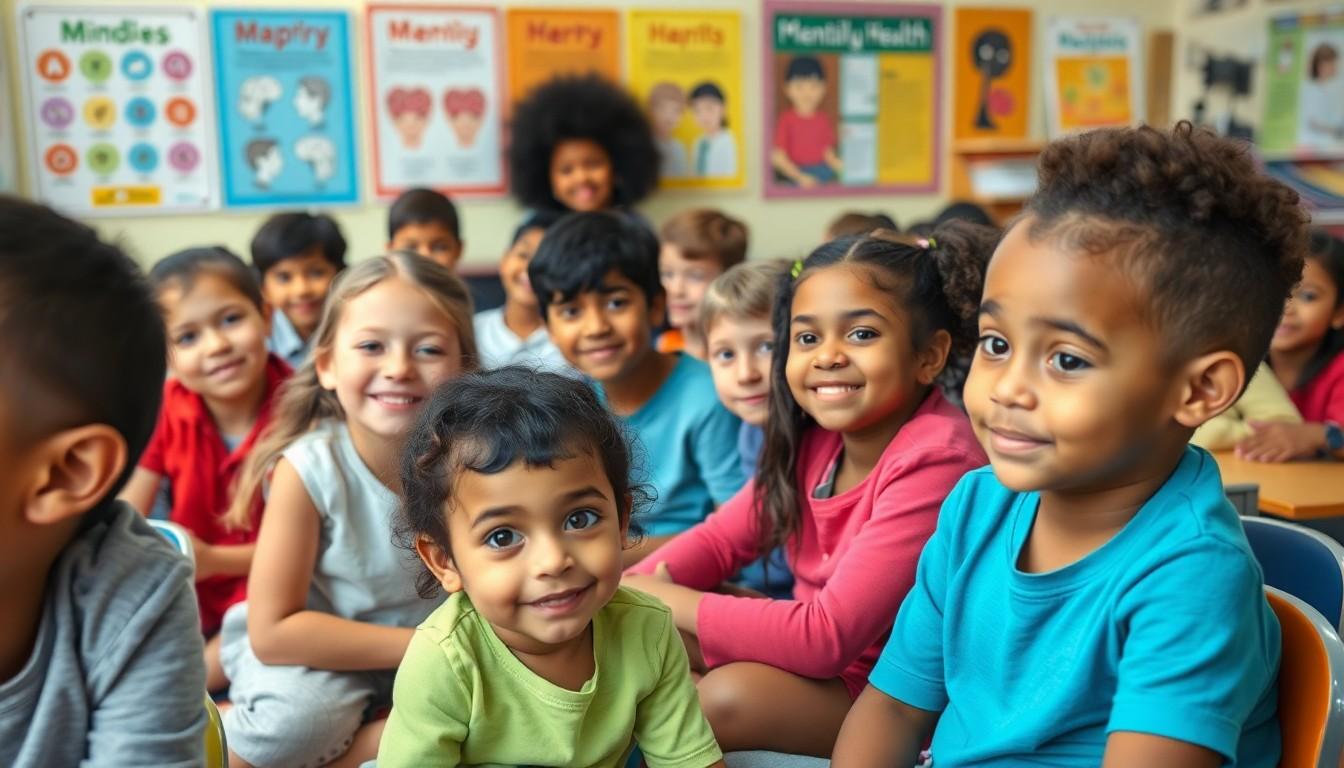Table of Contents
ToggleIn a world where kids juggle homework, friendships, and the occasional existential crisis over whether unicorns are real, mental health awareness is more crucial than ever. Just like they need to learn math and reading, understanding their emotions is key to thriving. After all, a happy kid is a productive kid—and who wouldn’t want to raise a mini genius who can also express their feelings?
Importance Of Mental Health Awareness For Kids
Mental health awareness for kids plays a critical role in their development. Understanding emotions helps them navigate life’s challenges more effectively. Enhanced emotional intelligence supports their relationships with peers and family.
Children equipped with mental health knowledge demonstrate improved resilience. Recognizing signs of stress or anxiety allows them to seek help early. Being aware of mental health reduces stigma and encourages open discussions.
Schools can integrate mental health education into their programs, fostering a supportive environment. By teaching coping strategies, children learn to manage their emotions in healthy ways. Positive reinforcement from parents and educators boosts confidence in addressing mental health issues.
Statistics reveal that one in six youth experiences a mental health disorder each year. Early intervention leads to better outcomes, reducing long-term mental health struggles. Quick access to resources can make a notable difference in a child’s life.
Parents must model healthy emotional behaviors, creating an atmosphere of trust. Open dialogues about feelings encourage children to express themselves without fear. Promoting mental health awareness cultivates a sense of community and belonging in young people.
Overall, prioritizing mental health education forms a foundation for children’s well-being. Providing tools for emotional management equips them for academic and personal success. Emphasizing mental health awareness from an early age ensures children grow into well-adjusted adults.
Understanding Mental Health In Children
Mental health significantly impacts children’s overall well-being. Early awareness fosters emotional intelligence, resilience, and better coping strategies.
Common Mental Health Issues
Anxiety disorders frequently affect children, leading to excessive worry or fear. Attention-deficit/hyperactivity disorder (ADHD) impacts focus, impulsivity, and activity levels. Depression manifests as persistent sadness or loss of interest in activities. Behavioral disorders, such as oppositional defiant disorder, can disrupt relationships and academic performance. Data shows that one in six youth experiences a mental health disorder annually, underscoring the importance of recognizing these issues early. Early intervention often results in better long-term outcomes.
Signs Of Distress In Children
Various signs indicate distress in children. Changes in mood, such as irritability or sadness, often signal underlying issues. Withdrawal from friends and family can indicate a lack of connection or support. Academic performance may decline as a response to emotional struggles. Changes in sleep patterns, including insomnia or excessive sleeping, may also arise. Physical symptoms, like stomachaches or headaches, sometimes correlate with emotional distress. It’s essential for parents and educators to recognize these signs, enabling timely support and intervention.
Strategies For Promoting Mental Health Awareness
Promoting mental health awareness among children involves collaboration with parents, educators, and communities. Effective strategies can make a significant difference in children’s emotional well-being.
Educating Parents And Guardians
Educating parents and guardians plays a crucial role in promoting mental health awareness. Workshops and seminars on identifying mental health issues equip caregivers with the necessary tools. Information on signs of emotional distress enhances awareness, enabling early intervention. Resources like brochures and online articles provide ongoing support for families. Open dialogues about mental health foster a supportive home environment, encouraging children to express themselves. When parents engage in discussions about emotions, children learn the importance of seeking help.
Engaging Schools And Communities
Engaging schools and communities enhances mental health awareness initiatives. Curriculum integration of mental health education presents vital concepts to students early on. School events such as mental health fairs create platforms for information sharing and connection-building. Collaboration with local mental health organizations expands resources available to families. Training teachers in recognizing mental health symptoms promotes proactive approaches. Partnerships with community organizations foster networks that ensure comprehensive support for children. When communities collectively prioritize mental health, ongoing support thrives.
Resources Available For Kids
Various resources exist to support kids’ mental health awareness. These tools include support groups, programs, and online resources tailored for their needs.
Support Groups And Programs
Support groups and programs offer a safe space for kids to express their feelings. Local community centers frequently host these gatherings, providing peer support. Schools often implement programs focusing on social-emotional learning, which builds resilience and coping skills. Organizations like NAMI (National Alliance on Mental Illness) provide resources for families seeking help. Connecting with others encourages kids to share experiences, reducing feelings of isolation. By fostering healthy relationships, these programs improve kids’ overall well-being.
Online Resources And Apps
Online resources and apps provide easy access to mental health information. Websites such as KidsHealth and Mindfulness for Teens convey vital lessons regarding emotional intelligence. Mobile applications designed for kids offer mindfulness exercises and stress management techniques. Programs like Moodfit and Headspace cater specifically to young users, promoting mental health awareness. Interactive tools engage children, encouraging them to learn coping strategies in a fun way. Utilizing these digital resources empowers kids to take charge of their mental health.
Conclusion
Raising awareness about mental health for kids is crucial in today’s world. By prioritizing emotional intelligence and mental health education, children can develop the skills they need to navigate life’s challenges. Early intervention and open conversations about mental health foster resilience and reduce stigma.
Parents, educators, and communities must work together to create supportive environments that empower kids to express their feelings and seek help when needed. With the right resources and strategies, children can thrive both academically and personally, laying the groundwork for a healthier future. Investing in mental health awareness is not just beneficial; it’s essential for nurturing well-rounded individuals who are prepared for the complexities of life.





